John Brown Gordon
When John Brown Gordon (left) died in 1904, President Theodore Roosevelt said of him, "A more gallant, generous, and fearless gentleman and soldier has not been seen by our country."
The man who inspired this comment was truly one of the most interesting and fearless leaders of the American Civil War.
When secession began sweeping across the south in early 1861, John Brown Gordon decided he must do his part and fight for the south. Though he was running coal mines in the Georgia, Tennessee, and Alabama mountains and had no military experience, he decided to organize a company of volunteers to fight in the coming war.
He recruited among the mountain men in the areas surrounding his mines, and was elected as Captain of his men. Thus, he held his first military office. His company of mountain men would come to be known as the Raccoon Roughs because of the coonskin caps they all wore.
When Gordon and his men marched off to war, his wife, Fanny Gordon, went along. Mrs. Gordon was always nearby, and generally had to be reminded to go to the rear as battle approached. Some officers considered her a nuisance. In fact, General Early once exclaimed that he wished the "Yankees" would capture Mrs. Gordon and hold her prisoner until the war was over. General Gordon on the other hand, prized her company, and was very grateful for her care of his many wounds. He would later jokingly write of her tending his wounds after the Battle of Antietam, "The doctors told Mrs. Gordon to paint my arm above the wound three or four times a day with iodine. She obeyed the doctors by painting it, I think, three or four hundred times a day. Under God's providence, I owe my life to her incessant watchfulness night and day, and to her tender nursing through weary weeks and anxious months."
Despite his total lack of military experience, John Brown Gordon learned fast, and quickly made an impression with his natural leadership skills. Promotions came quickly. He gained the unwavering devotion of his men by his utter fearlessness in the face of fire. The situation did not matter, Gordon always rode tall in the saddle while men fell all around him. Here is part of his account of the Battle of Seven Pines:
"As I spurred my horse over the works with my men, my adjutant, who rode at my side, fell heavily with his horse down the embankment, and both were killed. Reforming my men under a galling fire, and ordering them forward in another charge upon the supporting lines, which fought with the most stubborn resistance, disputing every foot of ground, I soon found that ... Lieutenant-colonel, major, adjutant, with their horses, were all dead, and I was left alone on horseback, with my men dropping rapidly around me. My soldiers declared that they distinctly heard the command from the Union lines, "Shoot that man on horseback." ... Nearly or quite half the line officers of the twelve companies had by this time fallen, dead or wounded ... Still I had marvellously escaped, with only my clothing pierced ... At this time my own horse, the only one left, was killed."
Not long after, Gordon led his men on an assault during the Battle of Malvern Hill. Despite the fact that they were completely exposed to the Union fire, and men were going down at a terrible rate, Gordon stalked fearless among his men urging them forward. Still, he was uninjured, "One shell had killed six or seven men in my immediate presence. My pistol, on one side, had the handle torn off; my canteen, on the other, was pierced, emptying its contents—water merely—on my trousers; and my coat was ruined by having a portion of the front torn away: but, with the exception of this damage, I was still unhurt."
During the Battle of Malvern Hill, Gordon was slightly injured when a shell threw dirt up into his eyes and temporarily blinded him. However, he recovered quickly, and it caused him no lasting problems.
Unfortunately, he would not always be so lucky...
The Walking (Civil War) Wounded...
By this time, John Brown Gordon (right) had begun to develop a reputation for being nearly invincible. His men definitely believed it was true, "So many had fallen at my side, so often had balls and shells pierced and torn my clothing, grazing my body without drawing a drop of blood, that a sort of blind faith possessed my men that I was not to be killed in battle. This belief was evidenced by their constantly repeated expressions: "They can't hurt him." "He's as safe one place as another." "He's got a charmed life." ... "
Little did his men know, their general would wind up being one of the most wounded officers to serve in the Civil War. Not only that, but he would receive five of those wounds in one battle. Following is Gordon's account of his wounds at the Battle of Antietam (Sharpsburg):
"If I had allowed these expressions of my men to have any effect upon my mind the impression was quickly dissipated when the Sharpsburg storm came and the whizzing Minies, one after another, began to pierce my body.
The first volley from the Union lines in my front sent a ball through the brain of the chivalric Colonel Tew, of North Carolina, to whom I was talking, and another ball through the calf of my right leg. On the right and the left my men were falling under the death-dealing crossfire like trees in a hurricane.
The persistent Federals, who had lost so heavily from repeated repulses, seemed now determined to kill enough Confederates to make the debits and credits of the battle's balance-sheet more nearly even. Both sides stood in the open at short range and without the semblance of breastworks, and the firing was doing a deadly work. Higher up in the same leg I was again shot; but still no bone was broken. I was able to walk along the line and give encouragement to my resolute riflemen, who were firing with the coolness and steadiness of peace soldiers in target practice. When later in the day the third ball pierced my left arm, tearing asunder the tendons and mangling the flesh, they caught sight of the blood running down my fingers, and these devoted and big-hearted men, while still loading their guns, pleaded with me to leave them and go to the rear, pledging me that they would stay there and fight to the last. I could not consent to leave them in such a crisis. The surgeons were all busy at the field hospitals in the rear, and there was no way, therefore, of stanching the blood, but I had a vigorous constitution, and this was doing me good service.
A fourth ball ripped through my shoulder, leaving its base and a wad of clothing in its track. I could still stand and walk, although the shocks and loss of blood had left but little of my normal strength. I remembered the pledge to the commander that we would stay there till the battle ended or night came. I looked at the sun. It moved very slowly; in fact, it seemed to stand still. I thought I saw some wavering in my line, near the extreme right, and Private Vickers, of Alabama, volunteered to carry any orders I might wish to send. I directed him to go quickly and remind the men of the pledge to General Lee, and to say to them that I was still on the field and intended to stay there. He bounded away like an Olympic racer; but he had gone less than fifty yards when he fell, instantly killed by a ball through his head. I then attempted to go myself, although I was bloody and faint, and my legs did not bear me steadily. I had gone but a short distance when I was shot down by a fifth ball, which struck me squarely in the face, and passed out, barely missing the jugular vein. I fell forward and lay unconscious with my face in my cap; and it would seem that I might have been smothered by the blood running into my cap from this last wound but for the act of some Yankee, who, as if to save my life, had at a previous hour during the battle, shot a hole through the cap, which let the blood out.
I was borne on a litter to the rear, and recall nothing more till revived by stimulants at a late hour of the night. I found myself lying on a pile of straw at an old barn, where our badly wounded were gathered. My faithful surgeon, Dr. Weatherly, who was my devoted friend, was at my side, with his fingers on my pulse. As I revived, his face was so expressive of distress that I asked him: "What do you think of my case, Weatherly?" He made a manly effort to say that he was hopeful. I knew better, and said: "You are not honest with me. You think I am going to die; but I am going to get well." Long afterward, when the danger was past, he admitted that this assurance was his first and only basis of hope."
While wounds like these would have killed many men, John Brown Gordon refused to die. The shot to the face left his left cheek quite disfigured (part of the scar can be seen in the top picture), and he was laid up in recovery for about seven months after Antietam. Throughout the War, he suffered at least eight battle wounds, but he never let one keep him off the field unless it was absolutely disabling. This is borne out by the story of when, in August 1864, he received a head wound during a skirmish in West Virginia, "Quite a lively skirmish ensued, in which Gordon was wounded in the head, but he gallantly dashed on, the blood streaming over him."
Throughout the remainder of the Civil War, John Brown Gordon proved his skill as a General many times during battles such as the Battles of the Wilderness and Spotsylvania Court House. General Lee even referred to him as one of his best Generals, being "characterized by splendid audacity."
...Post War
During the surrender of the Confederate Army at Appomattox, John Brown Gordon was chosen to lead the Confederate troops in review during the official surrender ceremony. During this review, Union General Joshua Chamberlain ordered his men to "carry arms" to salute their defeated foe. Chamberlain records Gordon's reaction, "Gordon at the head of the column, riding with heavy spirit and downcast face, catches the sound of shifting arms, looks up, and, taking the meaning, wheels superbly, making with himself and his horse one uplifted figure, with profound salutation as he drops the point of his sword to the boot toe; then facing to his own command, gives word for his successive brigades to pass us with the same position of the manual,—honor answering honor."
Appreciative of Chamberlain's gesture, Gordon would later write that he believed Chamberlain to be, "one of the knightliest soldiers of the Federal Army."
One of Gordon's most interesting stories involves his interaction with a Union General at the Battle of Gettysburg. It all began when General Gordon found General Francis Barlow lying wounded on the first day of the battle...
Upon finding the wounded officer, Gordon claims he aided him by taking a message for Barlow's wife, and having him transported to a field hospital. Gordon also claimed that he let Barlow's wife come through the lines to be with her husband. Gordon goes on to say that he believed Barlow must surely have died from his wounds, but Barlow recovered. Supposedly, Barlow later heard a report that Gordon had been killed in battle. Therefore, they were both quite surprised when they had a chance meeting in Washington D. C. some fifteen years after the war...
"Hon. Clarkson Potter, of New York ... invited me to dinner in Washington to meet a General Barlow who had served in the Union army. Potter knew nothing of the Gettysburg incident. I had heard that there was another Barlow in the Union army, and supposed, of course, that it was this Barlow with whom I was to dine. Barlow had a similar reflection as to the Gordon he was to meet. Seated at Clarkson Potter's table, I asked Barlow: "General, are you related to the Barlow who was killed at Gettysburg?" He replied: "Why, I am the man, sir. Are you related to the Gordon who killed me?" "I am the man, sir," I responded. No words of mine can convey any conception of the emotions awakened by those startling announcements. Nothing short of an actual resurrection from the dead could have amazed either of us more. Thenceforward, until his untimely death in 1896, the friendship between us which was born amidst the thunders of Gettysburg was greatly cherished by both."
Most historians believe this story to be exaggerated, mainly because the two men faced each other in battle after Gettysburg, and would surely have realized that the other was still alive. Nevertheless, it is an entertaining story that probably has some basis in fact...
After the war, John Brown Gordon became involved in Georgia politics. He was elected as U.S. Senator from Georgia twice (1873 and 1879), and was elected as Governor of Georgia in 1890.
Overall, John Brown Gordon was a courageous and lucky commander, who served with distinction and left behind some great stories from the American Civil War...
American Civil War Story - Home
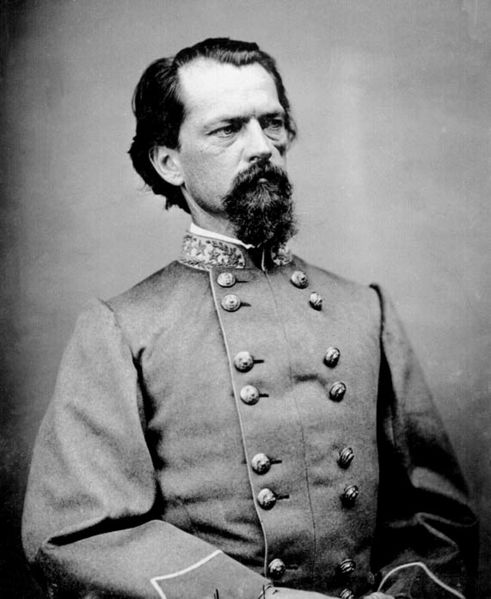

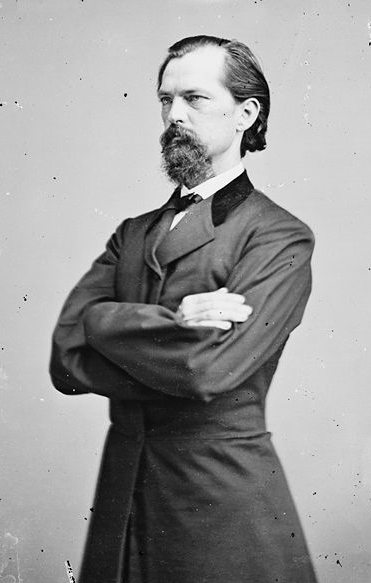
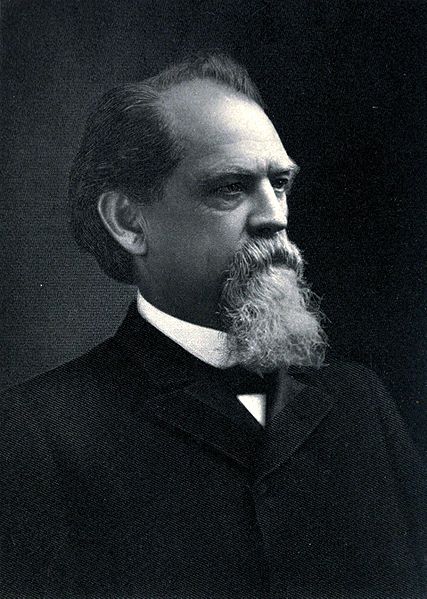
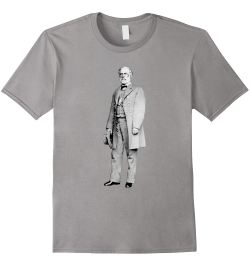
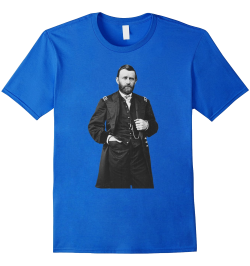

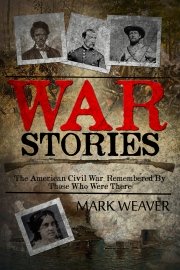
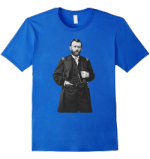
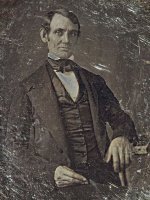
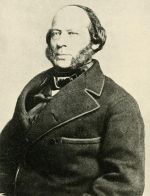
New! Comments
Have your say about what you just read! Leave me a comment in the box below.